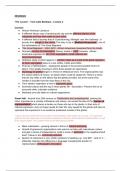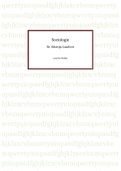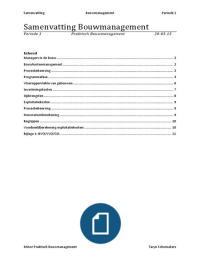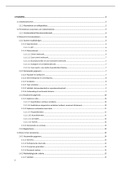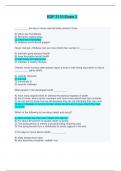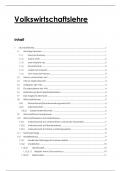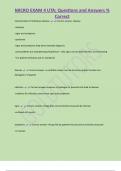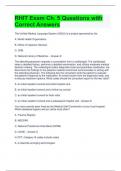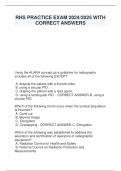09/10/2024
‘The Lesson’ - Toni Cade Bambara - Lecture 4
Context:
● African American Literature
● A different literary way of rendering the city and the different districts of the
metropolis and how they relate to each other.
● A different kind of journey that of ‘Good Morning, Midnight’ and ‘Mrs Dalloway’. A
journey from margin to the centre. The story is set in ‘Bedford-Stuyvesant’ - one of
the destinations of ‘The Great Migration’.
● ‘The Great Migration’ - 1910-1970 - African Americans movement from the South.
● Dramatic process of urbanisation. Slavery ended in 1863. However, African
Americans experienced Jim Crow segregation, racial violence and
disenfranchisement.
● Definitive study of what happens in northern cities as a result of the great migration -
de facto segregation kicks in in the 1930s, 1940s and 1950s.
● Process of ‘ghettoisation’ - keeping the people in the poorest possible forms of
labour. Poor quality housing in which these people are oppressed.
● Etymology of ‘ghetto’ begins in Venice in Mediaeval times. The original ghetto was
the Jewish district of Venice, an island which could be sealed off. There’s a sense
that the city relies on the labour that the ghetto provides, but at the same time,
renders it invisible from the main flows of the city.
● Term ‘ghetto’ engenders a kind of voyeuristic gaze.
● Dominant culture and the way it views ghetto life - fascination. Presents this to an
assumed white, suburban audience.
● Bambara turns the table on cultural suppositions.
Stuart Hall - theorist from 20th century on Thatcherism and unemployment, policing the
crisis. Important as a scholar of literature and culture. He coined the idea of the ‘burden of
representation’ which places a burden on those who are in the ghetto. In their acts of
cultural expression, they no longer speak for their life, they speak for the ghetto and have to
represent that experience to an audience positioned outside of the ghetto.
‘I want to absolve myself of the many burdens of representation which people carry around... I'm expected to
speak for the entire black race on all questions theoretical, critical etc, and sometimes for British politics, as well
as for cultural studies. This is what's known as the black person's burden’.
● Black nationalism - growing interest in forms of cultural autonomy.
● Growth of grassroots organisations who want to cut links with mainstream culture
and gain a sense of independence, build a sense of autonomy in the neighbourhood
itself. Tribute to this community activism.
● Speech of characters is very subtle variations of spelling e.g. ‘cost $35” - lack of ‘s’ -
efficiently captures this difference in language. Escaping the burden of
representation. Orthographic innovation.
‘The Lesson’ - Toni Cade Bambara - Lecture 4
Context:
● African American Literature
● A different literary way of rendering the city and the different districts of the
metropolis and how they relate to each other.
● A different kind of journey that of ‘Good Morning, Midnight’ and ‘Mrs Dalloway’. A
journey from margin to the centre. The story is set in ‘Bedford-Stuyvesant’ - one of
the destinations of ‘The Great Migration’.
● ‘The Great Migration’ - 1910-1970 - African Americans movement from the South.
● Dramatic process of urbanisation. Slavery ended in 1863. However, African
Americans experienced Jim Crow segregation, racial violence and
disenfranchisement.
● Definitive study of what happens in northern cities as a result of the great migration -
de facto segregation kicks in in the 1930s, 1940s and 1950s.
● Process of ‘ghettoisation’ - keeping the people in the poorest possible forms of
labour. Poor quality housing in which these people are oppressed.
● Etymology of ‘ghetto’ begins in Venice in Mediaeval times. The original ghetto was
the Jewish district of Venice, an island which could be sealed off. There’s a sense
that the city relies on the labour that the ghetto provides, but at the same time,
renders it invisible from the main flows of the city.
● Term ‘ghetto’ engenders a kind of voyeuristic gaze.
● Dominant culture and the way it views ghetto life - fascination. Presents this to an
assumed white, suburban audience.
● Bambara turns the table on cultural suppositions.
Stuart Hall - theorist from 20th century on Thatcherism and unemployment, policing the
crisis. Important as a scholar of literature and culture. He coined the idea of the ‘burden of
representation’ which places a burden on those who are in the ghetto. In their acts of
cultural expression, they no longer speak for their life, they speak for the ghetto and have to
represent that experience to an audience positioned outside of the ghetto.
‘I want to absolve myself of the many burdens of representation which people carry around... I'm expected to
speak for the entire black race on all questions theoretical, critical etc, and sometimes for British politics, as well
as for cultural studies. This is what's known as the black person's burden’.
● Black nationalism - growing interest in forms of cultural autonomy.
● Growth of grassroots organisations who want to cut links with mainstream culture
and gain a sense of independence, build a sense of autonomy in the neighbourhood
itself. Tribute to this community activism.
● Speech of characters is very subtle variations of spelling e.g. ‘cost $35” - lack of ‘s’ -
efficiently captures this difference in language. Escaping the burden of
representation. Orthographic innovation.

